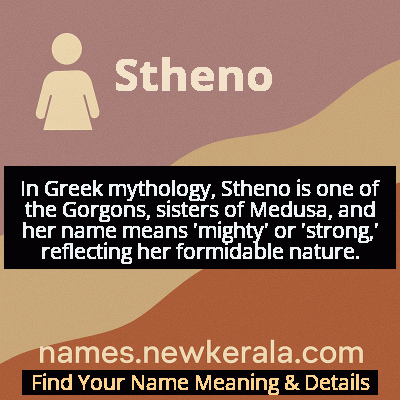Stheno Name Meaning & Details
Origin, Popularity, Numerology Analysis & Name Meaning of Stheno
Discover the origin, meaning, and cultural significance of the name STHENO. Delve into its historical roots and explore the lasting impact it has had on communities and traditions.
Name
Stheno
Gender
Female
Origin
Greek
Lucky Number
9
Meaning of the Name - Stheno
In Greek mythology, Stheno is one of the Gorgons, sisters of Medusa, and her name means 'mighty' or 'strong,' reflecting her formidable nature.
Stheno - Complete Numerology Analysis
Your Numerology Number
Based on Pythagorean Numerology System
Ruling Planet
Mars
Positive Nature
Generous, passionate, energetic, and humanitarian.
Negative Traits
Impulsive, impatient, moody, and can be overly emotional.
Lucky Colours
Red, maroon, scarlet.
Lucky Days
Tuesday.
Lucky Stones
Red coral, garnet.
Harmony Numbers
1, 2, 3, 6.
Best Suited Professions
Military, sports, philanthropy, leadership roles.
What People Like About You
Courage, energy, leadership, generosity.
Famous People Named Stheno
Stheno (Mythological)
Gorgon Sister
Eldest of the three Gorgon sisters, immortal and more ferocious than Medusa
Stheno (Literary)
Mythological Character
Featured in Hesiod's Theogony and various Greek epic poems as a formidable supernatural being
Stheno (Artistic)
Mythological Figure
Subject of numerous artworks depicting the Gorgon sisters, particularly in sculptures and paintings
Name Variations & International Equivalents
Click on blue names to explore their detailed meanings. Gray names with will be available soon.
Cultural & Historical Significance
The Gorgon sisters occupied a complex space in Greek religion and art, serving as apotropaic symbols to ward off evil. Stheno's specific role as the eldest and most powerful Gorgon emphasized the Greek understanding of primal forces that existed before the Olympian gods established order. Her mythological presence reflects ancient Greek anxieties about female power, transformation, and the boundaries between human and monstrous. The enduring legacy of Stheno in classical literature and art demonstrates how ancient cultures used mythological figures to explore fundamental questions about power, mortality, and the nature of the divine.
Extended Personality Analysis
Individuals named Stheno are typically perceived as possessing immense inner strength, resilience, and formidable determination. They embody the core meaning of their name—'mighty'—often demonstrating exceptional leadership qualities and the ability to overcome significant challenges. These individuals tend to be fiercely protective of those they care about, showing loyalty that matches the mythological Stheno's devotion to her sisters. Their strength is not merely physical but extends to emotional and intellectual fortitude, making them natural problem-solvers in difficult situations.
People with this name often exhibit a commanding presence and natural authority that others find both intimidating and inspiring. They typically possess strong convictions and are not easily swayed from their chosen path. While they may appear formidable at first encounter, those who earn their trust discover a deeply loyal and protective nature. The name suggests someone who embraces challenges rather than avoiding them, with an innate understanding that true strength involves both power and responsibility. Their personality often combines ancient wisdom with modern resilience, creating individuals who can navigate complex situations with both grace and determination.
Modern Usage & Popularity
In contemporary times, Stheno remains an exceptionally rare given name, primarily used by parents with a deep appreciation for Greek mythology or those seeking a powerful, unique name for their daughter. The name has seen minimal usage in birth records, making it one of the most distinctive mythological names available. Modern usage is largely confined to literary contexts, fantasy genres, and among classical scholars. The name's association with formidable female power makes it appealing to parents interested in strong, feminist namesakes, though its connection to monstrous mythology may give some pause. In recent years, there has been a slight increase in mythological name usage, potentially leading to greater awareness and occasional use of Stheno among naming enthusiasts seeking truly unique classical names.
Symbolic & Spiritual Meanings
Symbolically, Stheno represents ultimate strength, immortality, and primal power. Her name has come to symbolize the concept of invincibility and eternal strength in the face of adversity. In metaphorical terms, Stheno embodies the idea that true power often comes with isolation and that strength can be both protective and terrifying. The name symbolizes the duality of female power—both creative and destructive, nurturing and fearsome. In psychological terms, Stheno represents the shadow self or the parts of personality that society might label 'monstrous' but which contain immense power and potential. The symbolic meaning extends to concepts of sisterhood and loyalty, as Stheno remained fiercely devoted to her Gorgon sisters throughout mythology. Modern interpretations often view Stheno as a symbol of feminine rage transformed into power and the reclaiming of mythological figures traditionally viewed as monstrous.

